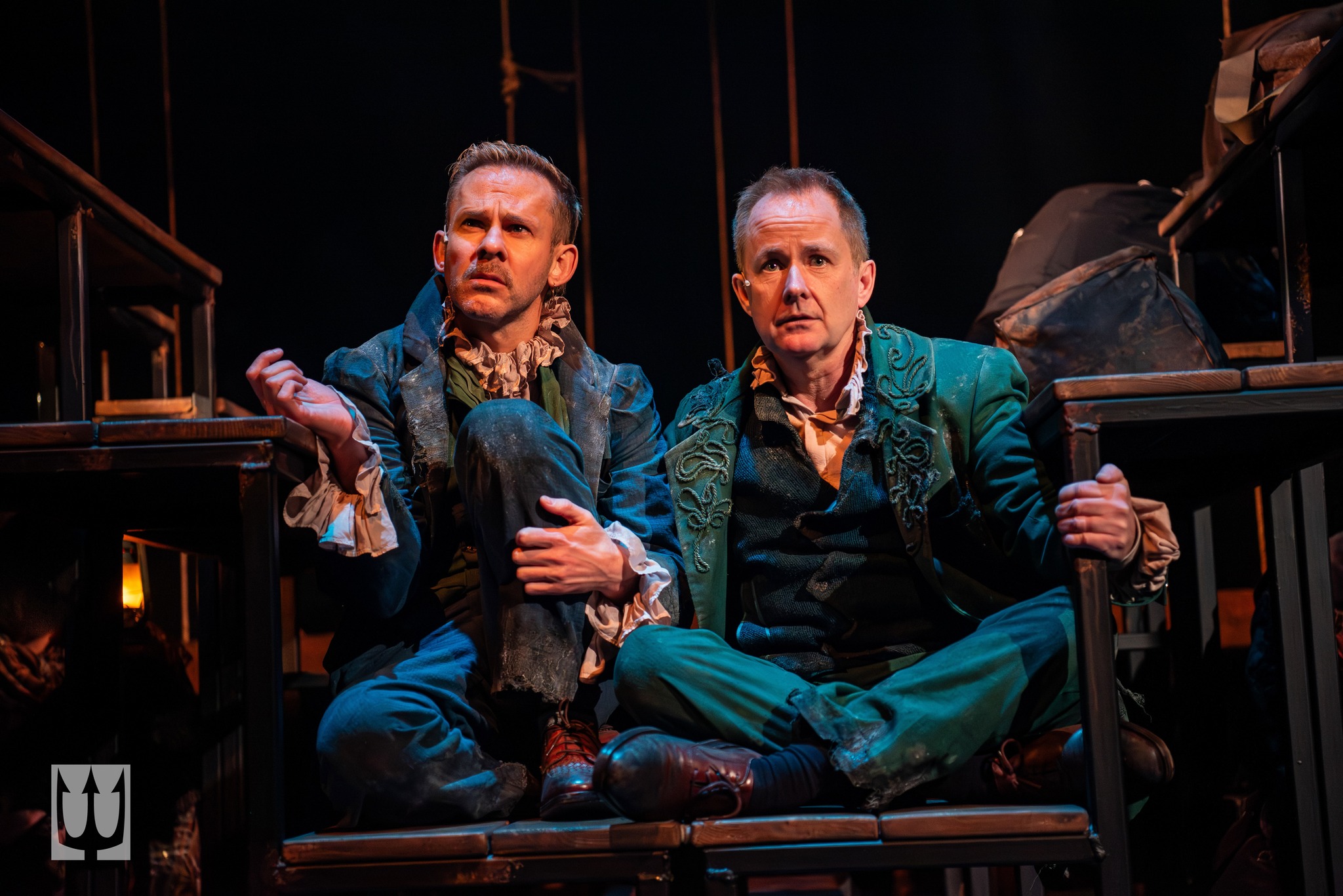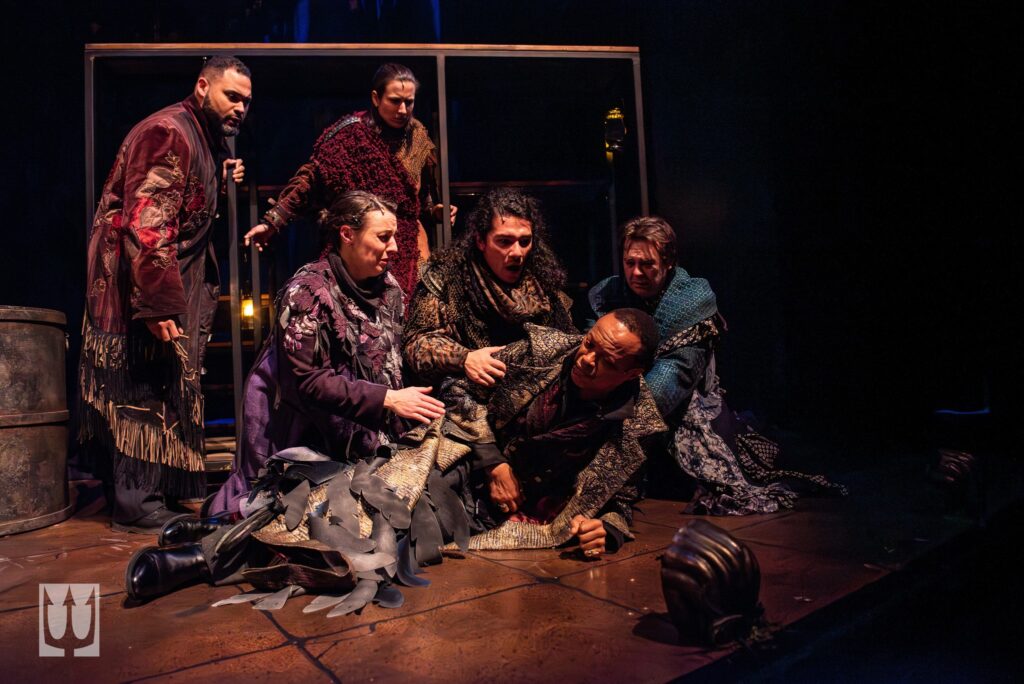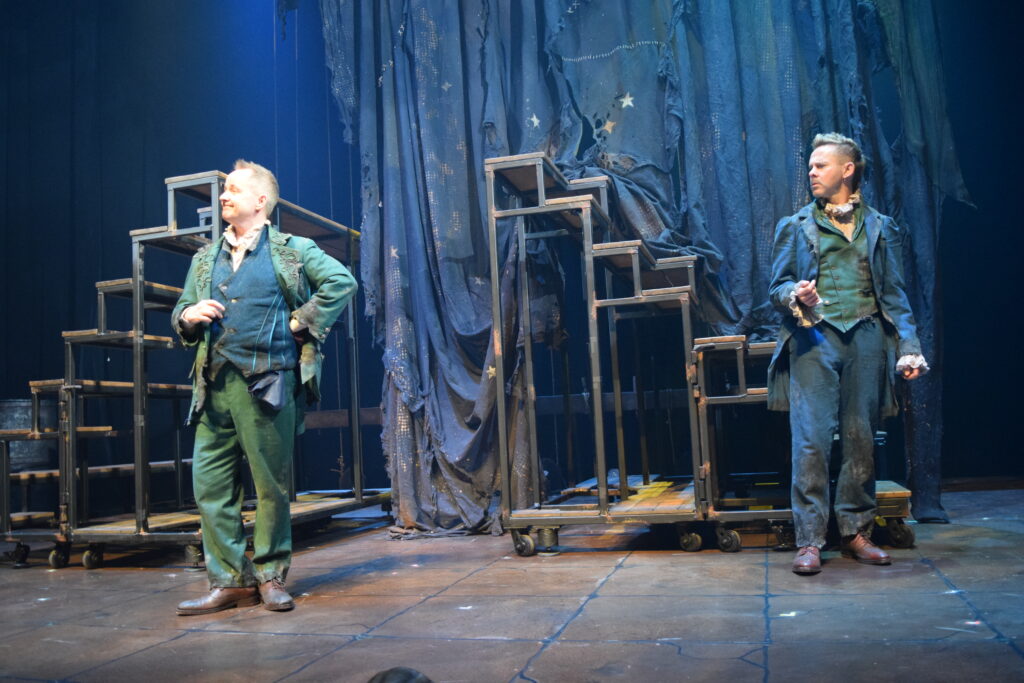
Dominic Monaghan & Billy Boyd. Photo by Stoo Metz.
What happens to a character in a play when they are not onstage? In Tom Stoppard’s 1966 play Rosencrantz and Guildenstern Are Dead, playing at Neptune Theatre in Halifax, Nova Scotia until February 25th, 2024, the playwright imagines a life for Rosencrantz and Guildenstern separate from their appearances as minor, but essential, characters in William Shakespeare’s Hamlet. While Stoppard gives Hamlet’s two courtier friends a great many lines, and rich, distinctive personalities, he keeps them in many ways constrained by the parameters that Shakespeare wrote for them. They only know what Shakespeare has had them know. They have difficulty recalling anything that happened before, or indeed after, their first and last mentions in Shakespeare’s play. Thus, Rosencrantz and Guildenstern are doomed to keep hitting the same plot points, driving the same story forward, that brings about their own fate, as well as Hamlet’s, Claudius’, and Gertrude’s, every time the curtain comes up again. In the same way, you could see a million different productions of Hamlet, all over the world, in different languages; you could travel through 400 years of history stopping to see Hamlet in each decade, and Rosencrantz and Guildenstern would keep saying essentially the same lines, and the ending for them would always be set in stone. Such is the rich theatrical tradition that, despite all the odds against it (heads), manages to endure to this very moment.
Stoppard manages to cram all of this into his play while also making it sharply intelligent, hilariously funny, and accessible even to those who have neither seen nor read Hamlet.
In this production Rosencrantz and Guildenstern are brought to vivid and poignant life by Dominic Monaghan and Billy Boyd respectively. From the first moments in the play, as Rosencrantz and Guildenstern flip coins while waiting for something to happen, or someone to arrive, speaking in terse, often nonlinear dialogue reminiscent of Vladimir and Estragon in Beckett’s play Waiting For Godot, the audience starts to develop an invested relationship with them. Even if we don’t always catch the meaning in their words, even if they remind us of the Mad Hatter or the Cheshire Cat, we care about Rosencrantz and Guildenstern, and as such, we view them as the protagonists, like Alice, travelling Through the Looking Glass, not the wacky people she encounters there. I think the heart of that care is the deep friendship that is immediately apparent between Rosencrantz and Guildenstern. Perhaps they cannot leave one another’s side because that is the way that Shakespeare has written them, but, what’s more important is that we get this beautiful and deep sense that, as much as they often drive one another up the wall, they would never choose to be free of the other, even if choice were available to them.
Boyd’s Guildenstern is a sort of philosopher, trying to make sense of the world around him using language and definitions, mathematical equations, and scientific theories, and he gets frustrated that real life so often cannot be crammed into a simple calculation. He is deeply aware of all that he does not know, and it scares him. He wants to understand why he is moving this story forward in this way, and whether there is any way that they could change the ways things are progressing if they could make different choices, or see things in a different way. He is verbose, and acts like a protector to Rosencrantz, who is more sensitive to emotions, and who tends to look at the world with more wonder, playfulness, and innocence. Monaghan’s Rosencrantz is a rapt audience for Boyd’s Guildenstern. He listens to him intently, almost sometimes in awe, although you also get the sense frequently that Rosencrantz has absolutely no idea what Guildenstern is saying. Yet, he seems to enjoy the performance of it, perhaps the familiarity of that is a comfort to him. I found myself wondering how anyone could ever stage this play with two actors who hadn’t been friends in real life for over twenty years, because Boyd and Monaghan’s chemistry together is so electric. Rosencrantz and Guildenstern are not saying their lines for the first time, and neither are Boyd and Monaghan, despite the fact that this audience may be hearing them fresh, these characters are caught in the theatrical loop: doomed to die one night and then rise again the next. Boyd and Monaghan so beautifully capture the dynamic of two people who are irrevocably linked in this continual state of Deja Vu.
Somewhere on the road Rosencrantz and Guildenstern meet the Tragedians, who at first are theatre at perhaps its most cynical or its most desperate for audiences. They reminded me of a troupe that might be competing against the Gladiators for patrons in Ancient Rome, or, maybe trying to lure fans away from staying home and binging The Game of Thrones. But through the players we get to see both Rosencrantz and Guildenstern’s roles on stage in Hamlet, and how they behave in the moments in Hamlet that we don’t see in Shakespeare. The leader of the troupe, The Player, is played by Michael Blake in a torrent of resistance and agitation for Rosencrantz and Guildenstern. Blake captures the sense of being both ancient and in constant flux, as both gaudy and artful, decaying, but vibrant, of this world, but also magical and ephemeral.

Within the Hamlet storyline Pasha Ebrahimi plays a Hamlet who uses his feigned madness to express the very real rage he feels with absolute abandon. This causes Ophelia, played by Helen Belay, to cower, not just afraid that he has gone mad, but also possibly afraid that he will physically hurt her. This raises the stakes for Polonius, Claudius, and Gertrude, since Hamlet isn’t just behaving strangely, he’s reckless and dangerous. Walter Borden brings a beautiful specificity to the role of status within the court, showing extreme deference to Claudius, the King, unsure how exactly to respond to Hamlet, who is also above his own station, but dismissing Rosencrantz and Guildenstern as expendables. Similarly, Claudius, played by Jonathan Ellul, is portrayed clearly as a King with absolute power, which raises the stakes both for Hamlet and for Rosencrantz and Guildenstern. This is not a man who will have his plans bungled; this is not a man to be fucked with.
The set by Andrew Cull is made up primarily of two risers on wheels with the backdrop of a shabby ship’s sail, which can double as a stage curtain. Here most of the technical theatre magic happens before the audience’s eyes (quite literally the wheels are showing). The Tragedians move the risers to suggest the waves, for example, when Rosencrantz and Guildenstern travel by boat to England with Hamlet. You get the sense that Hamlet is being performed in a typical theatre space, like inside the Maitlands’ house in Beetlejuice, while Rosencrantz and Guildenstern Are Dead is being performed in the Upside Down World outside of it. Similarly, the costumes by Kaelen MacDonald suggest the players as time travellers as well. Most striking is Raquel Duffy, who plays Hamlet’s mother, Gertrude, who is dressed in a very contemporary costume that makes her look like a rockstar. Perhaps she is the play’s nod to the recent trend of doing Shakespeare in modern dress. Although we don’t get to see much of her relationship with Claudius, the way she is dressed makes their dynamic inherently interesting. She doesn’t look like she exists simply to be someone’s mother. She clearly has her own arc and emotional journey through becoming a Queen, raising her son, the death of her husband, and becoming her brother in law’s wife that we never see. Does Hamlet reduce Gertrude to clichés when he assumes what her feelings and her motivations must be? How much choice does she have in the way the events play out? Duffy’s portrayal makes Gertrude even more mysterious as she doesn’t attempt to answer any of these questions. Unlike her clothes, she is reserved and guarded, behaving the way one would expect a Queen to behave, but very unlike the mother of distraught son. This strengthens the sense of the intense chokehold that Claudius has over everyone in his orbit.

Jeremy Webb directs the piece in a way that draws attention to the intricate world being created, but not at all to the director’s hand in making it so. The line between Webb and Stoppard feels very thin, and the line between Stoppard and Boyd and Monaghan is very thin again. Of course the play is written, and very meticulously so, but Billy Boyd and Dominic Monaghan riff off one another, bouncing jokes around like hacky-sacks or tennis balls, as though the ideas were coming to them right off the top of their heads.
I know I haven’t accurately captured here how incredibly funny this play is, and how hilarious Boyd and Monaghan are as these characters, running the gamut between silliness and absurdity, clown, whimsy, and wit. It is a play with huge themes, intense thoughtfulness, brilliant inside jokes for avid theatregoers, and a huge heart that I don’t think is necessarily inherent just on the page: the heart comes from Boyd and Monaghan.
All in all, this production of Rosencrantz and Guildenstern Are Dead is a huge triumph for Neptune Theatre, for Jeremy Webb, and for Halifax as a whole. It’s incredibly exciting to have a show so masterfully performed and imaginatively conceived start here, in Halifax, before travelling on to Toronto, rather than the other way around. The eyes of the theatre community across the country (and beyond!) are on Halifax, which is a role that Halifax is wildly unaccustomed to, but I hope this will be the beginning of a new era where Nova Scotia continues to come into her own as a leader, and an innovator in the Canadian Theatre.
I’m certain this will remain a definitive production of this play for me for as long as I continue to be rapt by watching a stage filled with actors playing with words.
Rosencrantz and Guildenstern Are Dead plays at Neptune Theatre’s Fountain Hall (1593 Argyle Street) until February 25th. Shows run Tuesday to Friday at 7:30pm and Saturday and Sunday at both 2:00pm and 7:30pm. The show is “sold-out”, but every day some tickets will be released for sale through the Neptune Box Office. Tickets range in price from $44.00 to $119.00 based on seating.
For tickets please call the Box Office at 902.429.7070 or visit in person at 1593 Argyle Street. This show is approximately 170 minutes, including 2 intermissions (Act 1: 50 minutes; Act 2: 58 minutes; Act 3: 37 minutes). Babes in arms & children under 4 are not permitted in the theatre. Please note: this show contains fog, haze, implied violence, brief references to suicide & sexual violence. Pirates can happen to anyone. No photos or recordings.
Neptune Theatre is fully accessible for wheelchair users. For more Accessibility Information Click Here.
Once this production closes in Halifax it will travel to Toronto, where it is being produced by Mirvish Productions. It opens at the CAA Theatre (651 Yonge Street, Toronto, Ontario) on March 5th and runs until March 31st. Tickets for the Toronto run are also extremely limited. For more information, please visit this website.





 World Theatre Day: My God Is It Ever The Time to Invest in Canadian Plays
World Theatre Day: My God Is It Ever The Time to Invest in Canadian Plays 
41 thoughts on “Boyd & Monaghan a Triumph in Neptune’s Rosencrantz & Guildenstern Are Dead (Or A Hit, A Very Palpable Hit)”
Comments are closed.